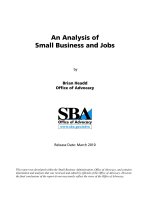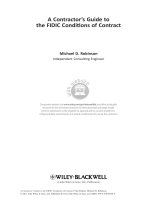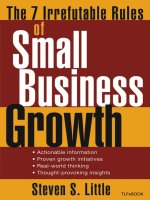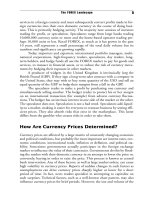The elements of small business a lay persons guide to the financial terms marketing concepts and legal forms that every entrepreneur needs john thaler
Bạn đang xem bản rút gọn của tài liệu. Xem và tải ngay bản đầy đủ của tài liệu tại đây (1.02 MB, 355 trang )
The Elements
of Small Business
A Lay Person’s Guide to the
Financial Terms, Marketing
Concepts and Legal Forms
that Every Entrepreneur Needs
John Thaler, Esq.
SILVER LAKE PUBLISHING
LOS ANGELES, CA
ABERDEEN, WA
The Elements of Small Business
A Lay Person’s Guide to the Financial Terms, Marketing Concepts and Legal Forms that Every Entrepreneur Needs
First edition
Copyright © 2005 by John Thaler
Silver Lake Publishing
P.O. Box 29460
Los Angeles, CA 90029
•
111 East Wishkah Street
Aberdeen, WA 98520
For a list of other publications or for more information, please call
1.360.532.5758.
All rights reserved. No part of this book may be reproduced, stored
in a retrieval system or transcribed in any form or by any means
(electronic, mechanical, photocopy, recording or otherwise) without the prior written permission of the copyright owner.
Library of Congress Catalogue Number: pending
The Elements ofSmall Business
A Lay Person’s Guide to the Financial Terms, Marketing Concepts
and Legal Forms that Every Entrepreneur Needs
Includes index.
Pages: 354
ISBN: 1-56343-805-4
Acknowledgments,
Dedication &
Disclaimer
This book would not have been possible without the aid and support of
my research assistant, James Souvay, and my personal assistant, Alison
Bock. Their tireless dedication to checking facts, locating information,
searching out forms, and copyediting resulted in a reference guide that
everyone can use.
Also, this book would not have been started without the simple words of
Jeffrey Rose, accountant extraordinaire, who said, “John, I think you should
write a book.” Hey, Jeff, I finally took your advice. Don’t let it go to your
head.
This book is dedicated to my wife and best friend, Melinda, who put up
with the long hours of work. And it is dedicated to my son, Matthew
(a.k.a. “Mr. Matthew”), who continues to amaze me every day with his
accomplishments. Someday soon he will snatch the pebble from my hand.
And now a word from our lawyers...
THIS BOOK IS INTENDED TO OFFER GENERAL INFORMATION ON MANY ISSUES PERTINENT TO SMALL BUSINESS
OWNERS. NEITHER SILVER LAKE PUBLLISHING NOR THE
AUTHOR IS ENGAGED IN OR ATTEMPTING TO RENDER LEGAL OR PROFESSIONAL ADVICE OR SERVICES. THOUGH
GREAT CARE HAS BEEN TAKEN TO ASSURE ACCURACY,
SOME MATERIAL MAY BE AFFECTED BY CHANGES IN LAWS
SINCE THIS BOOK WAS COMPLETED. IF LEGAL OR OTHER
EXPERT ADVICE IS NEEDED OR APPROPRIATE, YOU ARE
ADVISED AND ENCOURAGED TO OBTAIN THE SERVICES OF
A COMPETENT PROFESSIONAL.
THIS CLAUSE LIMITS OUR LIABILITY: THE PUBLISHER AND
AUTHOR HAVE USED THEIR BEST EFFORTS IN PREPARING
THIS BOOK. THE PUBLISHER AND AUTHOR MAKE NO
REPRESENTIONS OR WARRANTIES WITH RESPECT TO THE
ACCURACY OR COMPLETENESS OF THE CONTENTS OF THIS
BOOK AND SPECIFICALLY DISCLAIM ANY IMPLIED WARRANTIES OF MERCHANTABILITY OR FITNESS FOR A PARTICULAR PURPOSE. THERE WARRANTY MAY BE CREATED OR
EXTENDED BY SALES REPRESENTATIVES OR WRITTEN SALES
MATERIALS. THE ACCURACY AND COMPLETENESS OF ITS
CONTENTS ARE NOT GUARANTEED OR WARRANTED TO
PRODUCE A PARTICULAR RESULT FURTHER, THE ADVICE
AND INFORMATION CONTAINED HEREIN MAY NOT BE SUITABLE FOR EVERY INDIVIDUAL OR BE APPROPRIATE IN EVERY CIRCUMSTANCE. NEITHER THE PUBLISHER NOR AUTHOR SHALL BE LIABLE FOR ANY LOSSES OR ANY OTHER
DAMAGES WHETHER SPECIAL, INCIDENTAL OR CONSEQUENTIAL.
In other words, if you want the best advice for your situation, spend the
money to retain a good attorney or other competent professional. Come
on, it’s only a book.
—John Thaler
Table of Contents
Chapter 1: Welcome, Bienvenue, Shalom…
7
Chapter 2: Economics 101
19
Chapter 3: Business Formation
27
Chapter 4: Partnership Agreements
57
Chapter 5: Franchises
67
Chapter 6: Capital Formation
89
Chapter 7: Business Plans
103
Chapter 8: Marketing
119
Chapter 9: Leases, Landlords and You
141
Chapter 10: Insurance
165
Chapter 11: Business Equipment
179
Chapter 12: Accounting and Taxes
187
Chapter 13: Computers and E-Commerce
203
Chapter 14: Employees and Contractors
223
Chapter 15: Lawsuits and Lawyers
245
Chapter 16: Miscellaneous Issues
267
Chapter 17: Retirement Planning
277
Chapter 18: Marriage and Divorce
285
Chapter 19: Nonprofit Organizations
295
Chapter 20: Exit Strategies
317
Epilogue: Parting Glances
339
Appendix
341
Index
345
Chapter 1: Welcome, Bienvenue, Shalom…
Chapter 1
Welcome, Bienvenue, Shalom...
The two most engaging powers of an author
are to make new things familiar, familiar things
new.
—William Makepeace Thackeray
Running a business is never simple. But it can be simplified if you
invest the time to learn the basic elements. If you don’t, owning and operating your own business will likely become a complex nightmare of unforeseen and unresolved problems. I know. As an attorney who specializes in dealing with business problems, I have a lot of experience with
complexity. Let me start this chapter with one good example.
On a chilly November afternoon, a couple of guys sat in the office,
the location from which they operated several small businesses. The older
man rested comfortably in the black faux leather recliner. He leaned back
slightly as he looked at his younger partner who was seated across the
desk in a chair normally reserved for clients. They looked at each other
for a few seconds, neither uttering a word.
Then: “The deal looks good,” said the older man. “Make the call.”
The younger man nodded his agreement. At long last, they would
purchase the nightclub. These guys were not freshmen, they were not
7
The Elements of Small Business
beginners and they were not neophytes to the intricate details of operating
a small business. In fact, they owned other clubs and thought this one
would be a great addition. And they were certain that the purchase price
for the land, the improvement (a euphemism for the building) and the business fell far below their true value.
After telephoning the seller and arranging a meeting, they hopped in
the car and drove to “escrow.” Once there, they met with the purported
owner. Actually, they met with the alleged sole shareholder of the corporation that owned the land, the building and the improvement. A nice enough
guy. He had operated the club for more than a decade under the auspices
of a corporation. During the course of the meeting, they agreed once again
on the price and then shared the information with the escrow agent.
Everything about the deal seemed simple: the corporation would be
sold in a stock share purchase. The buyers would pay partly in cash and
partly through financing. The deal would close in 30 days. During that time
the entertainment and dance permits along with the alcohol permit would
be revised to reflect the names of the new shareholders. What could go
wrong? Everything.
Remember: Escrow is not the place where agreements are
written. No, that special place is located in your attorney’s
office. Escrow is like that neutral corner where a boxer stands
when his opponent is being counted out. Most people associate it with buying and selling their home. Escrow is nothing
more than trusted party ensuring that anything agreed to by
the parties is carried out to the letter. That’s all.
Do you know that in most states agreements for the purchase of real
property or agreements that include real property, such as a lease with an
option to buy, must be in writing? Neither the buyers nor the seller knew.
Do you know that the allocation of the total purchase price to the land, the
8
Chapter 1: Welcome, Bienvenue, Shalom…
improvement, and the business triggers different tax ramifications and liabilities? Neither the buyers nor the seller knew. Do you know that there
are different ramifications between an asset purchase versus a stock share
purchase? Do you know about a “UCC 6” bulk sales announcement,
when to use it, and how it removes potential creditor liabilities in an asset
purchase? Do you know what permits are required to operate a club
serving alcohol or to operate a club where dancing will take place.
We’re not done yet.
Do you know whether any zoning ordinances changed that might
result in the denial of a transfer of the permit? Do you know whether all
tax returns been filed, whether payroll taxes been paid, whether all sales
taxes been paid, especially in a stock share purchase? Do you know if a
workers’ compensation policy and liability policy (not to mention fire insurance policy) are in effect? Do you know how to get these policies?
How many employees are on the payroll? Are they doing a good
job? Will they remain under new management? If not, who will manage
the business? Are they trustworthy, especially in a business that sees a lot
of cash. Are more employees needed? Do you know if there are any liens
from lawsuits? Any community property issues?
Lots of Rude Surprises
Within a few weeks, the nightclub buyers discovered that the sole
shareholder had not filed any federal tax returns or state tax returns in
more than ten years—resulting in a suspension of the corporation many
years previous. So the buyers hired an accountant. They spent $88,000 in
back taxes and tax return preparation. The process took more than three
months. The suspension was lifted and so the sale continued…or not.
Then the buyers discovered that the shareholder had been married
and that, per the divorce judgment, the ex-wife held 50 percent interest in
the shares. They also discovered that per the terms of the divorce, she
had a right to review any purchase offers since she would be receiving one
half of the sale proceeds. She had a lawyer. And he wanted to review
everything. More delays.
9
The Elements of Small Business
Then the buyers discovered that the sales taxes had not been paid for
at least five years when an investigator for the state taxing authority called
to see about collecting the debt. With the suspension of the corporation,
that resulted in the retail sales license and its liability being “transferred” to
the seller. It also resulted in an audit and findings that more than $100,000
was owed. Not to be outdone and in going for that perfect record, the
payroll tax payments were a bit lacking as was the worker’s compensation insurance payments. More delays. And then there was the Labor
Board lien from an employee who had won a judgment against the corporation or the individual or from somebody.
The buyers’ financing company held on for a while but could not tie
up hundreds of thousands of dollars waiting for the deal to finish. Every
time the buyers reported that the deal was a “go,” they had to call back
telling the company that it was a “maybe.” Ultimately, the financing company lost interest in this mess and pulled out. Almost one year of time and
effort and $88,000 in damages later, no financing.
This 30-day escrow meandered into its eleventh month no closer to
resolution that it was on that November afternoon a year earlier. The deal
finally closed 16 months after the initial handshake.
Any attorney who specializes in business transactions has agreement
forms for asset purchases and for stock purchases. Those forms require
the seller to guarantee that each of the above taxes has been paid. And
they require the seller to guarantee that the business, including the stock, is
not encumbered (like subjecting any deal to the approval of an ex-spouse).
For less than $500, the buyers would have known that a problem existed
or would have had a great fraud suit against the seller.
A good attorney would have provided a checklist to the buyers
and made sure that they reviewed all necessary records and permits. Meanwhile, the attorney would have checked on zoning
and permit transfers. And the attorney would have examined the
insurance or made certain that liability and worker’s compensation insurance was available and at a reasonable rate.
10
Chapter 1: Welcome, Bienvenue, Shalom…
You might recall an episode of I Love Lucy where Lucy decides to
write a book about her life with Ricky and the Mertz’s. Her manuscript is
rejected by everyone except one publisher. When the publisher’s agent
came to visit, naturally Lucy is very excited. That is until she learns that
only a portion of the manuscript will be used in a textbook entitled, “Don’t
Let This Happen to You.”
That is the theme of this book.
My Experience
I come from a long line of lawyers. My father is a lawyer. During my
misguided youth (that which I can recall), I observed many small businesses. Some succeeded; others failed. I watched and I learned. And
then I became a lawyer, much to my own chagrin.
What many people don’t realize is that a law practice is a small business. In addition to the briefs that must be filed, the court hearings that
require my presence, the filing deadlines for complaints and motions, the
recycled paper requirement, and the stringent court-imposed deadlines
on everything, I have to bill clients and hope that they pay. I have to hire
and fire. I have to pay taxes. I have to manage and pay expenses and
apportion my time. Sound familiar?
In the past 10 years, I have had three clients wipe out my bills by
filing for bankruptcy. Recently, I was retained by a client who was a leading executive in the fashion industry. This woman had an annual income of
over $500,000 without consideration of her bonus. She and several other
parties were sued by a financial entity that had loaned money to a corporation in which they owned stock and to which they had pledged their
stock shares as security for the loan. After only three months, I convinced
the plaintiff’s lawyer to dismiss my client voluntarily. A motion requesting
dismissal would have cost at least $5,000.
You would think the client would have been grateful. Sure. On a total
bill of less than $2,000 for all the services provided over the course of six
months she sent $100 checks for a few months and then stopped. I wrote
her several letters. Finally, she sent a check for one half of the remaining
11
The Elements of Small Business
balance and a nasty letter telling me she would not pay any additional
amounts since I screwed up her case. In truth, I saved her tens of thousands of dollars in litigation costs.
I have a saying: the practice of law would be great if it weren’t for the
clients.
Not all clients are like the fashion maven. Most of my clients pay on
time, send me thank you letters and even refer their friends and relatives to
me. Nonetheless, like you, I need a place of business and that means
leasing office space. I need a billing system. I need a few employees including a secretary to handle everything from filing hundreds of pieces of
paper each week to answering over thirty telephone calls per day. I need
to purchase or lease certain equipment such as computers and copy machines. I need a constant stream of new business and I need (or pray for)
payment of my bills.
For more than a decade, I have dispensed advice to clients who
intend to create small businesses and to clients who already have them.
Some listen to me; others don’t. For the first and only time in this book, let
me paraphrase self-help guru Anthony Robbins: If you want to be successful, observe successful people and do what they do. That sounds
simple. For reasons only sociologists can explain, the practice of that adage is far more elusive.
People are far more emotional than logical. And when they become fixated on an idea, there is no technique or empathic dialogue that will permit me—or any advisor—to talk them out of a
bad idea. But the marketplace is the ultimate judge of good and
bad ideas. That’s what’s refreshing about business.
The fact is business requires hard work. But it is not just about hard
work. While feeling passionate about your business helps you to get up
every morning, having a narcissistic and narrow view that you can place a
restaurant on a site where 10 others have failed defies all logic. Success is
12
Chapter 1: Welcome, Bienvenue, Shalom…
about observation. What products or services are needed? How will you
fill that need? Are other businesses doing what you want to do? Are they
successful? If so, what you can discern from their success? If they are not
successful, can you really do it better? How will you do it better?
There are 24 million businesses in the United Stated defined as
“small.” You can bet that the proprietor works 18 hour days for the
privilege of not having a boss. And by the way, being on your own
means you will receive none of the customary benefits big companies provide—such as cheap medical insurance, cheap life insurance and employer contributions to your retirement plan.
Instead you get long hours, the agony of decision making, the expense of health insurance or the thrill of belonging to an HMO, and a
crash course in employer-employee relations when the secretary you hand
picked after countless interviews (all of which interfered with the time you
needed to develop new business) thinks that the work day begins at 10:00
A.M. and ends at 3:45 P.M. Also, if you can make the time for a vacation,
it’s not a paid vacation since you are not at your desk cultivating clients or
accounts (and neither is that new secretary).
Owning and operating a small business is not for everyone and probably is not for most people. But, if you are tired of making millions for
someone else—if you have the strength, the passion, the discipline and
dedication required—owning your business can be quite satisfying. You
answer to no one. You set the hours, you hire the employees, you choose
the direction the business will travel and you make it happen. The spoils
are yours to enjoy.
Consider this book to be a vocational testing device. If it all makes
sense when you get to the end, then operating your own business might be
right for you.
13
The Elements of Small Business
This Book Is Your Starter
This book is not the only one of its kind. So what distinguishes this
one from the others? That’s easy. Many authors and publishers claim that
with the author’s instruction you do not need an attorney or an accountant
or other professionals and specialists. Even if attorneys have evolved only
to one step below garden slugs, attorneys and other professionals are
absolutely essential components of operating a successful business.
In fact, you cannot be successful in small business without the advice
and assistance of a smart lawyer and a deft accountant. Anyone who tells
you different probably has some swampland in Florida or a bridge somewhere in the Brooklyn area of New York that he wants to sell.
The fact is you don’t know what you don’t know. No “how-to”
book in the world can make up for three years of law school, two years of
MBA study or years of testing and work credits leading to a CPA credential. And nothing, really nothing, can ever substitute for the years of
experience these experts possess.
There is no crime in ignorance. But there is stupidity in stubbornly refusing to seek out those who have the knowledge
and experience.
In our system of laws, rules and regulations, there are many loopholes and ambiguities. It took me three years of law school and many
years of practice to get to know them. I specialize in this stuff. You don’t.
You need the help of lawyers and accountants and other experienced
professionals to avoid situations that may hurt you. If you don’t believe
me, ask anyone you know who operates a successful small business. And
ask anyone who found himself or herself or their business in litigation.
My lawyer friends and I have a saying: It doesn’t take 100 clients to
build a successful law practice. It takes five who never listen. Don’t be
one of those five.
14
Chapter 1: Welcome, Bienvenue, Shalom…
Our journey begins with the issues of choosing to buy an existing
business or building your own from the ground up, including an examination of the different business entities available, including their pros and
cons. We’ll tell you how to go about making a partnership agreement,
should you decide to open that tack and feed store with your Cousin
Barry. One of your possible business choices is franchising.
We will then discuss how to determine if franchising is right for you,
including how they operate and the requirements for buying one. Next,
you’ll need to get some money for start-up capital, and we’ll tell you
where to look and give you some ideas on how to get it.
Once you’ve got the money, you’ll want to tackle the infamous business plan and think about marketing your product or service. More than
likely, an office or other space for your operation is needed. We’ll tell you
how to deal with commercial leases and the landlords that inadvertently
go with them. A tour through financing and operations is discussed along
with insurance and those dreaded taxes.
While almost every business is different, small business generally
falls into two categories: sale of goods from manufacturing to
retail or services from plant maintenance to business consulting.
Most of the topics in this book relate to both. Where little difference exists, little or no distinction is made. However, where significant differences exist, I will point them out to you.
Starting a business can be a most exciting and rewarding experience.
However, you may have to deal with some unpleasant situations. Some of
the most common unpleasant situations arise between partnerships in business. And although there are good times to be had running your business,
there may be other unfortunate incidents to deal with, like divorce or bankruptcy.
After all your hard work starting and running a successful business,
you will also want to look into retirement planning for yourself and your
employees, if you have any.
15
The Elements of Small Business
While the task at hand may seem overwhelming, the point here is not
to make you memorize a lot of information. Rather, this book will provide
you with the background necessary to understand the issues you face.
Business is a process of responding to changing conditions. You don’t
know what you don’t know. This is not a book for dummies. After reading this book, when an issue arises you won’t panic; you will know what
to do or who to call. That alone will increase your chances for success.
We have provided some forms for you to review. Unlike other books
that leave you with hundreds of forms or a CD-Rom, we have chosen to
include a sampling of what you can expect— because the fact is you must
learn to rely on the expertise of others if you want to succeed in your own
business.
So go to it and good luck.
16
Chapter 1: Welcome, Bienvenue, Shalom…
References
Attard, Jane. The Home Office and Small Business Answer Book:
Solutions to the Most Frequently Asked Questions about Starting and
Running Your Business. Henry Holt & Company (July 2000).
Bossidy, Larry, et al. Execution: The Discipline of Getting Things
Done. Crown Publishing Group (June 2002).
Koch, Richard. The 80/20 Individual: How to Accomplish More
by Doing Less. Doubleday & Co., Inc. (August 2003).
Zimmerer, Thomas W., and Norman M. Scarborough. Essentials
of Entrepreneurship and Small Business Management (3rd Ed.). Pearson
Education (June 2001).
17
The Elements of Small Business
18
Chapter 2: Economics 101
Chapter 2
Economics 101
If all economists were laid end to end, they
would not reach a conclusion.
—Anonymous
Anyone in business needs to have sharp understanding of business
elements. But this doesn’t have much to do with all the chattering about
the stock markets or economic trends that you see on cable television,
hear on the radio or read in most newspapers.
Sure, economic trends affect business. In a recession, everyone has
less money to spend and small businesses are more likely to fail. But these
things happen in many steps. Most business journalism simply tries to
locate trends.
Check out the headlines of any major newspaper: “The recession
will not subside until next year, economists say.” Or: “Economists predict
greater sales in the high tech sector but a slowdown in durable goods this
holiday season.” Or: “Housing Starts will continue to grow, economists
conclude. What is a housing start? How does it finish? Who are these
economists and why are they so important?
Most Americans are uneducated when it comes to economics. Maybe
they took a class in college…or maybe not.
19
The Elements of Small Business
How will the trade deficit affect your business venture? How will the
federal deficit affect interest rates and borrowing? What are durable goods
and who orders them? And what about the strength of the Yen as compared to the dollar as compared to the Euro?
This book is not a dissertation on economics. However, before you
decide to take the plunge and take it with your life savings, you
must consider the economic environment that faces you. This is
especially important if you rely on parts or supplies from overseas
where the economy of foreign countries and the currency exchange rates affect you’re your operating costs.
Paying attention to the changing economic climate and knowing how
it will affect your business is important. So let’s examine a few key terms
and conditions and how they might relate to you. But remember: this is not
a treatise. It is meant to assist you in recognizing the effects of external
economic conditions on your new business venture.
Recession
A recession occurs when too many goods have been produced versus the number of buyers. Why is this a problem? Because if warehouses
are filled with goods no one is purchasing, then manufacturers have no
reason to manufacture. Profits decline as the retail prices decline. Businesses lay off workers. In turn, the workers apply for government benefits
and pay little or no taxes back to the government. That causes increased
deficits. Depending on the party in power, higher deficits, especially at the
state level may result in higher taxes. That places additional burdens on
new businesses.
But a recession also creates certain advantages. It is an employer’s
market when so many skilled workers are unemployed. If manufacturers
have built too many widgets and your business depends on widgets, then
your purchase costs will be greatly reduced. And for consumers, the final
20
Chapter 2: Economics 101
product, sitting in the warehouse, will go on sale long before the afterChristmas sale.
In fact, a recession can be one of the best times to create a
business and to hire employees. As the economy recovers,
your business is ready to go.
Futurist Alvin Toffler wrote a well known book entitled Futureshock.
Among his many observations was the analysis that technology is developing faster than the average person can adjust to using it. Do your parents have a computer? If so, do they think that if they hit the wrong button
the planets will collide? Mine do. Actually, a recent example of this problem involves Personal Digital Assistants (PDAs).
The people who build PDAs spent most of the late 1990s building
new and improved PDAs with more and more features no one could
understand and would never use. The manufacturers did not consider that
they were creating technology at a pace the average consumer could not
understand. If they could not understand it, then they were not going to
buy it. And they didn’t. As a result the early 2000s saw a glut of PDAs in
the marketplace—and a recession for PDA makers and their suppliers.
Building the better mousetrap does not always result in a sale. In
business, a warehouse full of the best mousetraps is the worst
possible scenario.
Inflation
Inflation occurs when the cost of goods rises faster than the income
of those who have to pay for them. Sometimes this happens because
21
The Elements of Small Business
consumers are purchasing goods and services at a rate faster than companies can manufacture or provide them. Or this results from external
factors such as shortages in raw materials which in turn create higher prices.
Or this results from increased requirements (i.e., taxes) by the state or
federal governments to cover employee benefits such as health care or
family leave—with the added cost being passed on to you.
In the early 2000s, people in the United States have seen inflation
result from changes in oil prices. Wide fluctuations have caused unleaded
gasoline to range from $1.35 to more than $2.00 per gallon. Think about
it. If your company depends on shipping or if your business involves pizza
delivery, gas prices make a difference.
Higher costs to manufacturers and service providers mean higher
prices to consumers. So do increases in the minimum wage or
increases in insurance costs, workers’ compensation costs or employee benefits. If California passes a law requiring employers to
cover medical expenses for employees, that cost often results in
job cuts or higher prices for the goods and services—or both.
Then we have the minimum wage. When I was a child, I asked my
mother why the government could not just give everyone a million dollars.
Everyone would be a millionaire. My mother gave the only answer she
could: “I don’t know. Go ask your father.”
The fact is most of our inflation gets exported. That is, companies
beat inflation and increases in the minimum wage by building factories
overseas and paying far less labor costs. In the past few years, service
industry jobs have traveled overseas. Check out the Microsoft annual
report with respect to the number of high tech jobs performed in India.
Or people get laid off. Several years ago while on vacation, I met a
man who owned a Baskin Robbins franchise in Lemon Grove, California,
a suburb of San Diego. The state had just raised the minimum wage from
$5.85 to $6.25. Between the higher hourly wage and the various payroll
taxes (a subject I will discuss in detail later), he was left with two choices:
22
Chapter 2: Economics 101
raise the price of the ice cream or hire one less high school student during
summer vacation.
But sometimes, like with increased gasoline prices or increased raw
material prices, there are no alternatives for businesses except to raise
prices. Hence inflation.
Gross Domestic Product (GDP)
In measuring the state of the economy, economists often discuss the
GDP figures. GDP does nothing other than measure the number of transactions in the economy regardless as to whether the transactions are positive or negative. It is measured on a quarterly basis.
What constitutes a transaction? Basically, any exchange of money
for a product or service. For example, if you go to the supermarket and
purchase a Hostess Cupcake, that is one transaction. If you tip the bag
boy and he uses that tip to purchase a cheeseburger at McDonald’s, then
you have another transaction. And so forth.
Why is this figure so significant? Three reasons: firstly, a recession is
defined as two or more straight quarters of negative GDP; secondly, the
more transactions in the economy, the more people who have to be involved in the transactions. So a high “GDP” figure often equates with
higher employment or at least the need to hire more people.
Projections of higher GDP in the future mean more people working.
The third reason: the greater number of transactions, the more taxable
events. When you purchased the cupcake, you paid sales tax. When the
bag boy bought the cheeseburger, he paid a sales tax. And so on.
Economist Arthur Laffer, famous for the “Laffer Curve,” opined in
the 1980s that the country could grow its way out of deficits by
lowering tax rates. Less taxes would mean more spending and
more spending would result in more taxable events via higher
GDP. Many economists laughed at him. But his curve reflected the
dynamic nature of the GDP.
23
The Elements of Small Business
In the late 1990s when the country ran budget surpluses, it was due
primarily to a strong GDP. The increase in taxable transactions actually
eliminated the deficit. In fairness, many economists do not believe that a
reduction of taxes on the rich stimulates the economy; they’d prefer reductions that focused on middle class households. But no one can deny
that, for a short time, the budget was balanced as a result of growth.
Federal Funds Rate
Unlike many European countries, the United States does not have a
central bank. Instead, it has a Treasury Department (those nice folks who
print the money) and an independent Federal Reserve Board. The Board
members set monetary policy. The Federal or “Fed” Funds Rate is the
rate of interest the government charges banks for borrowing money. This
rate is set by the Federal Reserve Board.
Lower interest should result in more borrowing because the rate ultimately affects the interest you pay on a loan or line of credit from your
neighborhood bank. More borrowing means more spending and more
spending means higher GDP.
Periodically, the Federal Reserve Board meets to discuss and determine the interest rates. The Board also states its future intentions. If you
intend to apply for a bank loan or a line of credit, interest rates may play a
significant role. If you have reason to believe that rates will increase in the
future and you have plans for expansion or for start-up, you might want to
obtain a loan before the rates increase. Also, if you plan to buy large
quantities of supplies from manufacturers, you can bet that their higher
borrowing costs will result in higher costs to you; so, if you know you’ll
need a million widgets, you should get them sooner later rather than later.
Exchange Rates & More Information
As we discussed previously, the rate of exchange can have a significant effect on your business. Are you buying raw materials from afar or
24









